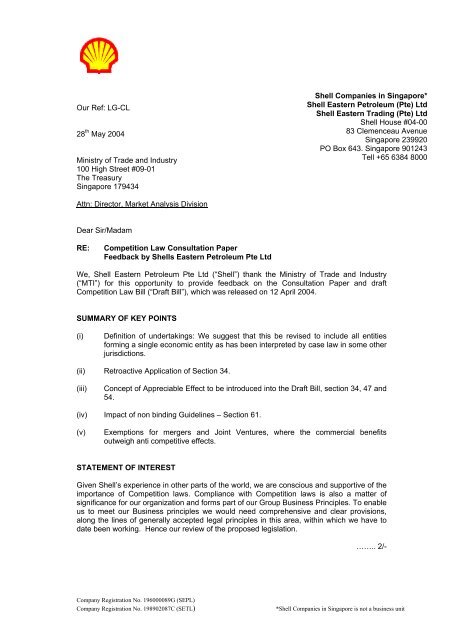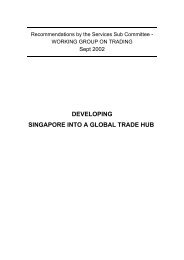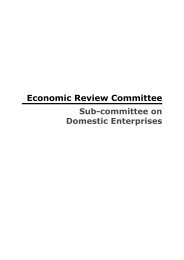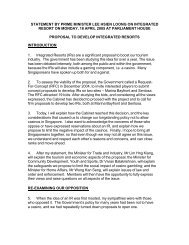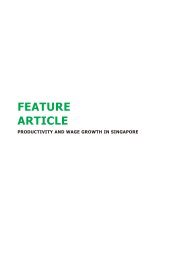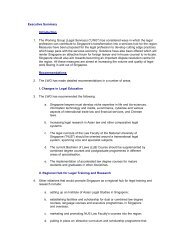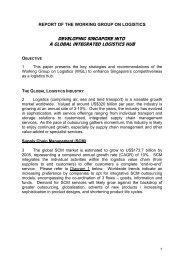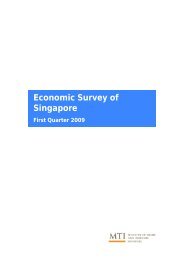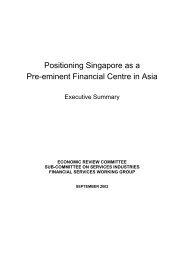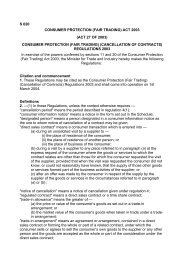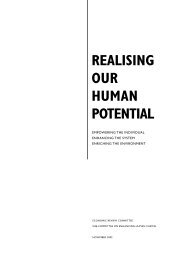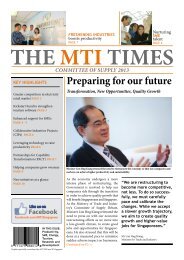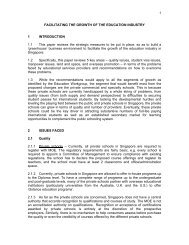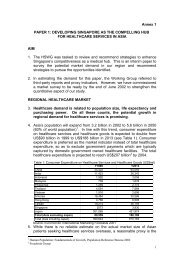Shell Eastern Petroleum Pte Ltd - Ministry of Trade and Industry
Shell Eastern Petroleum Pte Ltd - Ministry of Trade and Industry
Shell Eastern Petroleum Pte Ltd - Ministry of Trade and Industry
Create successful ePaper yourself
Turn your PDF publications into a flip-book with our unique Google optimized e-Paper software.
Our Ref: LG-CL<br />
28 th May 2004<br />
<strong>Ministry</strong> <strong>of</strong> <strong>Trade</strong> <strong>and</strong> <strong>Industry</strong><br />
100 High Street #09-01<br />
The Treasury<br />
Singapore 179434<br />
<strong>Shell</strong> Companies in Singapore*<br />
<strong>Shell</strong> <strong>Eastern</strong> <strong>Petroleum</strong> (<strong>Pte</strong>) <strong>Ltd</strong><br />
<strong>Shell</strong> <strong>Eastern</strong> Trading (<strong>Pte</strong>) <strong>Ltd</strong><br />
<strong>Shell</strong> House #04-00<br />
83 Clemenceau Avenue<br />
Singapore 239920<br />
PO Box 643. Singapore 901243<br />
Tell +65 6384 8000<br />
Attn: Director, Market Analysis Division<br />
Dear Sir/Madam<br />
RE:<br />
Competition Law Consultation Paper<br />
Feedback by <strong>Shell</strong>s <strong>Eastern</strong> <strong>Petroleum</strong> <strong>Pte</strong> <strong>Ltd</strong><br />
We, <strong>Shell</strong> <strong>Eastern</strong> <strong>Petroleum</strong> <strong>Pte</strong> <strong>Ltd</strong> (“<strong>Shell</strong>”) thank the <strong>Ministry</strong> <strong>of</strong> <strong>Trade</strong> <strong>and</strong> <strong>Industry</strong><br />
(“MTI”) for this opportunity to provide feedback on the Consultation Paper <strong>and</strong> draft<br />
Competition Law Bill (“Draft Bill”), which was released on 12 April 2004.<br />
SUMMARY OF KEY POINTS<br />
(i)<br />
Definition <strong>of</strong> undertakings: We suggest that this be revised to include all entities<br />
forming a single economic entity as has been interpreted by case law in some other<br />
jurisdictions.<br />
(ii) Retroactive Application <strong>of</strong> Section 34.<br />
(iii)<br />
Concept <strong>of</strong> Appreciable Effect to be introduced into the Draft Bill, section 34, 47 <strong>and</strong><br />
54.<br />
(iv) Impact <strong>of</strong> non binding Guidelines – Section 61.<br />
(v)<br />
Exemptions for mergers <strong>and</strong> Joint Ventures, where the commercial benefits<br />
outweigh anti competitive effects.<br />
STATEMENT OF INTEREST<br />
Given <strong>Shell</strong>’s experience in other parts <strong>of</strong> the world, we are conscious <strong>and</strong> supportive <strong>of</strong> the<br />
importance <strong>of</strong> Competition laws. Compliance with Competition laws is also a matter <strong>of</strong><br />
significance for our organization <strong>and</strong> forms part <strong>of</strong> our Group Business Principles. To enable<br />
us to meet our Business principles we would need comprehensive <strong>and</strong> clear provisions,<br />
along the lines <strong>of</strong> generally accepted legal principles in this area, within which we have to<br />
date been working. Hence our review <strong>of</strong> the proposed legislation.<br />
…….. 2/-<br />
Company Registration No. 196000089G (SEPL)<br />
Company Registration No. 198902087C (SETL)<br />
*<strong>Shell</strong> Companies in Singapore is not a business unit
Page 2/-<br />
28 th May 2004<br />
Our Ref: LG-CL<br />
RE: Competition Law Consultation Paper<br />
We set out below, our comments on the bill.<br />
1. DEFINITION OF UNDERTAKING - SINGLE ECONOMIC ENTITY RULE<br />
The definition <strong>of</strong> “undertaking” is cast in very wide language <strong>and</strong> will extend to any<br />
dealings between companies operating within the same group.<br />
Case law in the European Union <strong>and</strong> in several other jurisdictions have interpreted<br />
the word “undertaking” to exclude group companies operating within the same<br />
economic entity. Given this developed state <strong>of</strong> international principles, <strong>Shell</strong><br />
proposes that the Draft Bill should expressly provide that group companies<br />
operating within the same economic entity are excluded from the reach <strong>of</strong> the Draft<br />
Bill.<br />
In the absence <strong>of</strong> such exemption, group companies would find it difficult if not<br />
impossible to function.<br />
A number <strong>of</strong> businesses currently operate in this manner <strong>and</strong> a specific exemption<br />
would remove any uncertainty as regards the application <strong>of</strong> competition laws to<br />
group companies, as well as lingering doubts as to whether the Commission or the<br />
courts in Singapore will view European Union case law as persuasive authority.<br />
Alternatively, if the exemption is not expressly provided in the Bill, then it must be<br />
included into Guidelines.<br />
If an express provision to exempt single economic entities is to be included<br />
(whether in the Bill or in Guidelines), an appropriate definition <strong>of</strong> when a group can<br />
be regarded as operating within a single economic entity must also be provided. On<br />
this, the test <strong>of</strong> control has been adopted in the European Union. For avoidance <strong>of</strong><br />
doubt, any definition <strong>of</strong> ‘control’ introduced should be in accordance with that<br />
existing in the Companies Act <strong>and</strong> the Securities <strong>and</strong> Futures Act. It can <strong>and</strong><br />
should, therefore, extend beyond mere shareholding ownership.<br />
2. RETROSPECTIVE EFFECT OF BILL<br />
Section 34(5) <strong>of</strong> the Draft Bill provides as follows:<br />
“subsection (1) applies to agreements, decisions <strong>and</strong> concerted<br />
practices implemented before, on or after the appointed day.”<br />
This section means that the competition laws will catch all existing agreements that<br />
businesses have entered into or are participating in when it comes into force. This<br />
would require organizations to review all their existing arrangements. Apart from<br />
being onerous, this places organizations in a vulnerable position for any potential<br />
allegations <strong>of</strong> a breach.<br />
…… 3/-<br />
Company Registration No. 196000089G (SEPL)<br />
Company Registration No. 198902087C (SETL)<br />
*<strong>Shell</strong> Companies in Singapore is not a business unit
Page 3/-<br />
28 th May 2004<br />
Our Ref: LG-CL<br />
RE: Competition Law Consultation Paper<br />
<strong>Shell</strong>, therefore, proposes that the competition laws only apply to agreements that<br />
undertakings enter into from the date <strong>of</strong> the coming into force <strong>of</strong> the competition<br />
laws or from such prescribed date as may be set. If the latter option is adopted,<br />
then the MTI must give sufficient notice <strong>of</strong> the prescribed date so that undertakings<br />
can manage their affairs appropriately <strong>and</strong> ensure they are in compliance with the<br />
laws. Furthermore, in the case <strong>of</strong> agreements entered into prior to the appointed<br />
date, the provisions that may be <strong>of</strong>fensive should be void, but not the entire<br />
agreement unless it is not possible for the agreement to st<strong>and</strong> alone without the<br />
provision (e.g. an agreement that has as its sole purpose anti-competition<br />
objectives). MTI must also provide that no action taken prior to the appointed date<br />
arising from or in connection with these agreements be actionable.<br />
3. APPRECIABLE EFFECT<br />
The Consultation Paper at page 2, paragraph (b)(i) reads:<br />
“Instead <strong>of</strong> attempting to catch all forms <strong>of</strong> anti-competitive<br />
agreements or conduct in all markets, focus will be placed on anticompetitive<br />
agreements or conduct that will have an appreciable<br />
adverse effect on markets in Singapore.”<br />
Sections 34, 47 <strong>and</strong> 54 <strong>of</strong> the Draft Bill, however, provide that any agreement which<br />
could inter alia distort competition, or where there is an abuse <strong>of</strong> dominant position,<br />
or where there is a substantial lessening <strong>of</strong> competition as a consequence <strong>of</strong> a<br />
merger, is prohibited. This is wider than the stated intent in the Consultation Paper.<br />
Case law in the European Union <strong>and</strong> the United Kingdom show that the courts have<br />
not been consistent in whether the stricter test <strong>of</strong> appreciable effect is to be used to<br />
ascertain whether an act is anti-competitive. As such, it may be prudent in the<br />
interest <strong>of</strong> promoting commercial activity <strong>and</strong> certainty, that the words “appreciable<br />
effect” be included into the Draft Bill, so that the stated intent in the Consultation<br />
Paper is given effect to.<br />
At the very least, if the MTI desires to leave the legislation widely stated, then<br />
guidelines should be prescribed which use precise language to explain how<br />
sections 34, 47 <strong>and</strong> 54 <strong>of</strong> the Draft Bill will be interpreted.<br />
4. DISSIMILAR CONDITIONS TO EQUIVALENT TRANSACTIONS<br />
Sections 34(2)(d) <strong>and</strong> 47(2)(c) <strong>of</strong> the Draft Bill provide as an instance <strong>of</strong> potentially<br />
anti-competitive behaviour, the following:<br />
“apply dissimilar conditions to equivalent transactions with other<br />
trading parties, thereby placing them at a competitive<br />
disadvantage.”<br />
……….4/-<br />
Company Registration No. 196000089G (SEPL)<br />
Company Registration No. 198902087C (SETL)<br />
*<strong>Shell</strong> Companies in Singapore is not a business unit
Page 4/-<br />
28 th May 2004<br />
Our Ref: LG-CL<br />
RE: Competition Law Consultation Paper<br />
It is not uncommon for a party to negotiate varied terms with its customers<br />
depending on volume <strong>and</strong> term requirements. Also, it is not unusual to <strong>of</strong>fer<br />
different credit terms to a customer on the basis that he is a better paymaster <strong>and</strong><br />
has better credit rating than another customer who frequently defaults on payments<br />
or drags on payments. Imposing dissimilar conditions in such instances can in<br />
effect contribute towards greater economic efficiencies rather than have anticompetitive<br />
effect.<br />
When dissimilar conditions are applied because <strong>of</strong> the type <strong>of</strong> trading party<br />
involved, the dissimilar conditions evidently do not have as their objective the<br />
prevention restriction or distortion <strong>of</strong> competition, but could unknowingly have the<br />
effect <strong>of</strong> preventing, restricting or distorting <strong>of</strong> competition. Additionally, under<br />
section 47, such conditions are deemed to indicate abuse.<br />
The unintended impact <strong>of</strong> the specific wording in these sections could lead to an<br />
undesirable impact on businesses <strong>and</strong> <strong>Shell</strong> proposes that for the purposes <strong>of</strong><br />
section 34 <strong>of</strong> the Draft Bill, the prohibition should be modified such that only<br />
agreements between undertakings which impose an obligation or agreement or<br />
consensus to apply dissimilar conditions with a view to distorting competition be<br />
prohibited. Similarly, for purposes <strong>of</strong> section 47, <strong>Shell</strong> proposes that the differing<br />
terms with the objective <strong>of</strong> abusing dominant position be deemed an abuse <strong>and</strong> not<br />
the mere existence <strong>of</strong> differing terms.<br />
5. MERGERS SECTION 54<br />
It is felt that the regulations governing this section need to be clear <strong>and</strong><br />
comprehensive as it is a very important area for businesses. Exemptions in<br />
particular from these rules need to be clearly defined <strong>and</strong> <strong>Shell</strong> proposes that there<br />
be greater clarity as to what forms <strong>of</strong> partnerships <strong>and</strong> alliances between<br />
undertakings are intended to be caught, in particular as noted by the MTI in the<br />
Consultation Paper an additional element is that there are no other <strong>of</strong>fsetting<br />
efficiencies. Leaving it to interpretation by the Commission or by the courts could<br />
create substantial uncertainty for the businesses.<br />
As the MTI is aware, joint ventures are formed for a number <strong>of</strong> varying reasons with<br />
varying commercial benefits which <strong>of</strong>ten clearly outweigh any anti-competitive<br />
effects, including the following:<br />
‣ Greater economies <strong>of</strong> scale with the end result <strong>of</strong> better consumer welfare.<br />
‣ More effective management <strong>of</strong> group companies.<br />
‣ Does not restrict, distort or prevent competition.<br />
………5/-<br />
Company Registration No. 196000089G (SEPL)<br />
Company Registration No. 198902087C (SETL)<br />
*<strong>Shell</strong> Companies in Singapore is not a business unit
Page 5/-<br />
28 th May 2004<br />
Our Ref: LG-CL<br />
RE: Competition Law Consultation Paper<br />
Given this, <strong>Shell</strong> proposes that an appropriate provision be included in the Draft Bill<br />
to allow joint ventures where the commercial benefit brought about by the joint<br />
venture substantially outweighs any anti-competitive effects that may peripherally<br />
arise. In particular, the exemption must extend to any agreement between<br />
undertakings which are intended to obtain cost synergies <strong>and</strong> improve efficiencies,<br />
e.g. production joint ventures or co operation agreements for logistics.<br />
Confirmation is also sought that the Merger provisions will not be put into effect until<br />
all regulations have been comprehensively completed.<br />
6. HORIZONTAL AGREEMENTS<br />
Section 34 <strong>of</strong> the Draft Bill is widely worded <strong>and</strong> can potentially prohibit all<br />
horizontal arrangements. Given that horizontal arrangements do contribute<br />
significantly to economic development as well as to more efficient services, the<br />
Commission should issue guidelines containing illustrations as to how horizontal<br />
agreements should be treated. This is the approach taken in the European Union.<br />
7. RESTRICTIVE COVENANTS / RIGHT OF FIRST REFUSAL ETC<br />
The Draft is silent as to whether restrictive covenants, rights <strong>of</strong> first refusal <strong>and</strong> noncompete<br />
clauses (collectively “restriction clauses”) in contracts will be caught as<br />
being non-competitive. Such clauses are introduced into contracts for a number <strong>of</strong><br />
commercial reasons, including maintaining the quality <strong>of</strong> services <strong>of</strong>fered.<br />
Case law from the European Union indicates that there is no consistent approach<br />
adopted as to whether a restriction in an agreement which does not necessarily<br />
have as its object the prevention or distortion <strong>of</strong> competition is or is not anticompetitive.<br />
<strong>Shell</strong> proposes that for the avoidance <strong>of</strong> doubt, there should be an express<br />
exemption providing that restriction clauses in a contract are not anti-competitive<br />
where the commercial benefits <strong>of</strong> such clauses outweigh the anti-competitive<br />
effects.<br />
8. BLOCK EXEMPTIONS FOR ANTI-COMPETITIVE AGREEMENTS ETC<br />
<strong>Shell</strong> notes that the Commission can make recommendations for block exemptions<br />
to be granted under section 38 <strong>of</strong> the Draft Bill. The section does not allow for<br />
applications to be made by undertakings for block exemptions to be granted.<br />
Query Is it the intention that block exemptions be granted by the Commission to<br />
relevant agreements across the board Should the section be modified to allow for<br />
all undertakings to be able to apply for block exemptions to be granted in the same<br />
way as it can for individual exemptions<br />
…… 6/-<br />
Company Registration No. 196000089G (SEPL)<br />
Company Registration No. 198902087C (SETL)<br />
*<strong>Shell</strong> Companies in Singapore is not a business unit
Page 6/-<br />
28 th May 2004<br />
Our Ref: LG-CL<br />
RE: Competition Law Consultation Paper<br />
9. FRIVOLOUS COMPLAINTS<br />
The Draft Bill does not deal with the issue <strong>of</strong> frivolous complaints. Frivolous<br />
complaints could unnecessarily result in increased costs for the business subject to<br />
investigation as a consequence <strong>of</strong> having to comply with investigation requests by<br />
the Commission. It can also result in disruption to work in the event that documents<br />
<strong>and</strong> equipment are removed from the premises.<br />
<strong>Shell</strong> is conscious that this has to be balanced against the need to monitor<br />
competition compliance <strong>and</strong> not deter whistleblowers or other legitimate<br />
complainants, <strong>and</strong> would agree with that. <strong>Shell</strong>, nevertheless, considers some<br />
protection may be necessary so as not to leave undertakings exposed to possible<br />
unjustified costs.<br />
10. SELF REPORTING<br />
<strong>Shell</strong> proposes that provision be made in the Draft Bill (both at the Commission <strong>and</strong><br />
court levels) to take cognisance <strong>of</strong> by imposition <strong>of</strong> reduced penalties <strong>and</strong> fines or<br />
by way <strong>of</strong> a warning only where an alleged anti-competitive company or <strong>of</strong>ficer<br />
there<strong>of</strong> alerts the Commission <strong>of</strong> the activity. This will act to encourage greater selfregulation<br />
<strong>and</strong> make the task <strong>of</strong> the Commission less onerous.<br />
11. COMPLIANCE<br />
11.1 Guidelines To Ensure Compliance<br />
Section 61(1) <strong>of</strong> the Bill provides that Guidelines will be issued to<br />
undertakings to order their affairs to ensure compliance with the<br />
competition laws.<br />
Section 61(4) provides that the Guidelines are not binding on the<br />
Commission. This questions the effectiveness <strong>of</strong> the Guidelines if it cannot<br />
be used as a shield against the Commission.<br />
11.2 Difference Between Obtaining Guidance Or decision<br />
The Bill includes provisions allowing undertakings to apply for guidance or<br />
issue a notification for a decision from the Commission. There does not<br />
appear to be any material difference between the effect <strong>of</strong> obtaining<br />
guidance <strong>and</strong> or a decision. Clarification is sought on the purpose that is<br />
intended to be achieved.<br />
11.3 Powers Of Investigation - Extent Of Confiscation<br />
The Commission’s power to take away documents with or without a warrant<br />
is couched in very wide terms. Specifically, the Commission can take away<br />
documents that have the following effect:<br />
…… 7/-<br />
Company Registration No. 196000089G (SEPL)<br />
Company Registration No. 198902087C (SETL)<br />
*<strong>Shell</strong> Companies in Singapore is not a business unit
Page 7/-<br />
28 th May 2004<br />
Our Ref: LG-CL<br />
RE: Competition Law Consultation Paper<br />
‣ ‘a bearing on the investigation’ or<br />
‣ that is ‘relevant to the investigation’ or<br />
‣ that is ‘<strong>of</strong> the relevant kind’.<br />
Whilst such broad powers ensure a more efficient investigation process, it<br />
can be disruptive for the business. As a counter balance, <strong>Shell</strong> proposes<br />
that the request for documents be limited to those directly connected with<br />
the incidents <strong>and</strong> further that the business can make copies or retain such<br />
equipments under prescribed conditions to enable the business to carry on<br />
its business.<br />
In the case <strong>of</strong> a section 54 <strong>of</strong> the Draft Bill violation, <strong>Shell</strong> proposes that<br />
rather than a raid, a request for document be made to the undertaking. This<br />
request can be fulfilled in the presence <strong>of</strong> the investigating <strong>of</strong>ficers <strong>of</strong> the<br />
Commission. This is because in Merger projects, the documentation<br />
involved is voluminous. But more importantly, in an alleged Merger<br />
violation, unlike in sections 34 or 47 violation, there is less likely to be an<br />
immediate impact.<br />
11.4 Powers Of Investigation – Searching A Person<br />
Section 64(5)(c) <strong>of</strong> the Draft Bill empowers the investigating <strong>of</strong>ficer <strong>of</strong> the<br />
Commission to enter premises <strong>and</strong> search any person on those premises “if<br />
there are reasonable grounds for believing that that person has in his<br />
possession any document or article which has a bearing on the<br />
investigation”. <strong>Shell</strong> is <strong>of</strong> the view that this power is too wide. <strong>Shell</strong><br />
proposes that, if indeed a power to search a person is necessary, then<br />
adequate safety procedures for the respect <strong>of</strong> the individual must be put in<br />
place.<br />
12. COMPLAINTS / APPLICATIONS TO COMMISSION AND COURT<br />
The Draft Bill does not prescribe timelines within which the Commission <strong>and</strong> the<br />
Board <strong>of</strong> Appeal must hear submissions <strong>and</strong> h<strong>and</strong> down its decision Presumably<br />
this will be set out in regulations or in Guidelines.<br />
Providing guidance on the timelines is an important requirement that aids certainty<br />
as to when key target dates for filings, submissions <strong>and</strong> final decision are. This will<br />
enable businesses to better plan their activities without the concern <strong>of</strong> pending<br />
complaints hanging over them.<br />
……8/-<br />
Company Registration No. 196000089G (SEPL)<br />
Company Registration No. 198902087C (SETL)<br />
*<strong>Shell</strong> Companies in Singapore is not a business unit
Page 8/-<br />
28 th May 2004<br />
Our Ref: LG-CL<br />
RE: Competition Law Consultation Paper<br />
13. CONCLUSION<br />
As a general comment, <strong>Shell</strong> emphasises that clarity <strong>and</strong> certainty in the proposed<br />
competition laws to be introduced is essential. This requires the language used in<br />
the Draft Bill to be clear, <strong>and</strong> any exemptions or carve outs introduced concise <strong>and</strong><br />
to the point. Any vagueness in language could result in uncertainty for the business<br />
<strong>and</strong> a tendency to adopt a “play safe” attitude which is likely to cause an influx <strong>of</strong><br />
administrative work for the Commission, resulting in delays in achieving business<br />
targets <strong>and</strong> an inefficient application <strong>of</strong> the competition laws.<br />
Yours sincerely,<br />
for <strong>and</strong> on behalf <strong>of</strong><br />
SHELL EASTERN PETROLEUM (PTE) LTD<br />
Mrs Lalita Bajwa<br />
Head, Legal Department<br />
Company Registration No. 196000089G (SEPL)<br />
Company Registration No. 198902087C (SETL)<br />
*<strong>Shell</strong> Companies in Singapore is not a business unit


